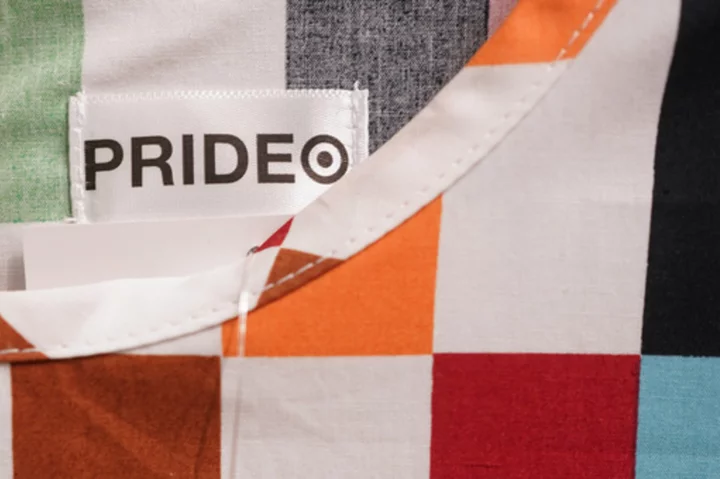NEW YORK (AP) — Target once distinguished itself as being boldly supportive of the LGBTQ+ community.
It risked losing that status on Wednesday after removing some LGBTQ+-themed products, and hiding Pride Month displays in certain Southern locations, to address online complaints and in-store confrontations that it says were a threat to employees’ well-being.
Target now faces a potential second backlash from customers who are upset by the discount retailer’s reaction to aggressive, anti-LGBTQ+ activism, which has also been sweeping through Republican state legislatures. Civil rights groups chided the company for caving to anti-LGBTQ+ customers who tipped over displays and expressed outrage over gender-fluid bathing suits.
“Target should put the products back on the shelves and ensure their Pride displays are visible on the floors, not pushed into the proverbial closet,” Human Rights Campaign president Kelley Robinson said in a statement. “That’s what the bullies want.”
The uproar over Target’s Pride Month marketing — and its response to critics — is just the latest example of how companies are struggling to cater to different groups of customers at a time of extreme cultural divides, particularly around transgender rights.
Bud Light is still dealing with the fallout after an attempt to broaden its customer base by partnering with transgender influencer Dylan Mulvaney. Its parent company is tripling its U.S. marketing spending this summer as it tries to restore lost sales.
In Florida, Disney has been engaged in a legal battle with Gov. Ron DeSantis since expressing opposition to the state's classroom limits on discussing gender identity and sexual orientation.
Allen Adamson, the co-founder and managing partner of the marketing firm Metaforce, said Target should have anticipated the backlash and varied the products it sells by region in the first place.
“Once they fold to the more extreme edges of the issue, then they’ve lost their footing,” he said. “If you can change a big brand just by knocking over a display, then they are on the defense, and you never win on the defense.”
Shares of Target, which is based in Minneapolis, fell more than 3 percent on Wednesday.
According to a 2021 Gallup poll, 21% of people in Generation Z identify as lesbian, gay, bisexual or transgender, compared with 3% of Baby Boomers. Gallup has also found that younger consumers are most likely to want brands to promote diversity and take a stand on social issues.
“Pulling back is the worst thing that they could have done, said Jake Bjorseth, who runs trndsttrs, an agency helping brands understand and reach Gen Z customers. “Not to expect potential backlash is to not understand what (LGBTQ+) members go through on a daily basis.”
It wasn’t long ago that Target was seen as a trailblazer among retailers in the way it embraced LGBTQ+ rights and customers.
It was among the first to showcase themed merchandise to honor Pride Month, which takes place in June, and it has been out front in developing relationships with LGBTQ+ suppliers.
In 2016, when national debate exploded over transgender rights, the company put out a press release that declared “Inclusivity is a core belief at Target” and said it supported transgender employees and customers using whichever restroom or fitting room “corresponds with their gender identity.” After facing boycotts and backlash from customers, Target announced months later that it would expand the use of a third single toilet bathroom that would be locked by users.
But the company is operating in a very different environment now.
There are close to 500 anti-LGBTQ+ bills that have gone before state legislatures since the start of this year, according to the American Civil Liberties Union. At least 17 states have enacted laws restricting or banning gender-affirming care for transgender minors, though judges have temporarily blocked their enforcement in some states.
The controversy at Target has been exacerbated by several misleading videos circulating online. In some, people falsely claimed the retailer was selling “tuck-friendly” bathing suits for kids. “Tuck friendly” suits allow trans women who have not had gender-affirming operations to conceal their private parts.
”Given these volatile circumstances, we are making adjustments to our plans, including removing items that have been at the center of the most significant confrontational behavior,” Target said in a statement Tuesday.
But it was business as usual at many Target locations on Wednesday.
At the Target in Topeka, Kansas, the Pride display remained up front, visible as shoppers passed a corral of shopping carts right after the entrance. It included Pride-themed clothing for kids, as well as T-shirts and women’s bathing suits for adults.
“I like that our local stores here have it front and center, when you walk in,” said Shay Hibler, a Topeka self-employed small business owner who was shopping with her 13-year-old daughter and supports LGBTQ+ rights.
Megan Rusch, a Kansas City-area resident who is studying criminal justice at Washburn University in Topeka, was shopping at the same store and said while stores in other areas might worry about their image locally, “This is a pretty diverse area.”
She said she believes it’s good for the stores to have the Pride displays so that LGBTQ+ customers feel included.
___
Durbin contributed from Detroit. AP Writer John Hanna in Topeka, Kansas contributed to this report.

